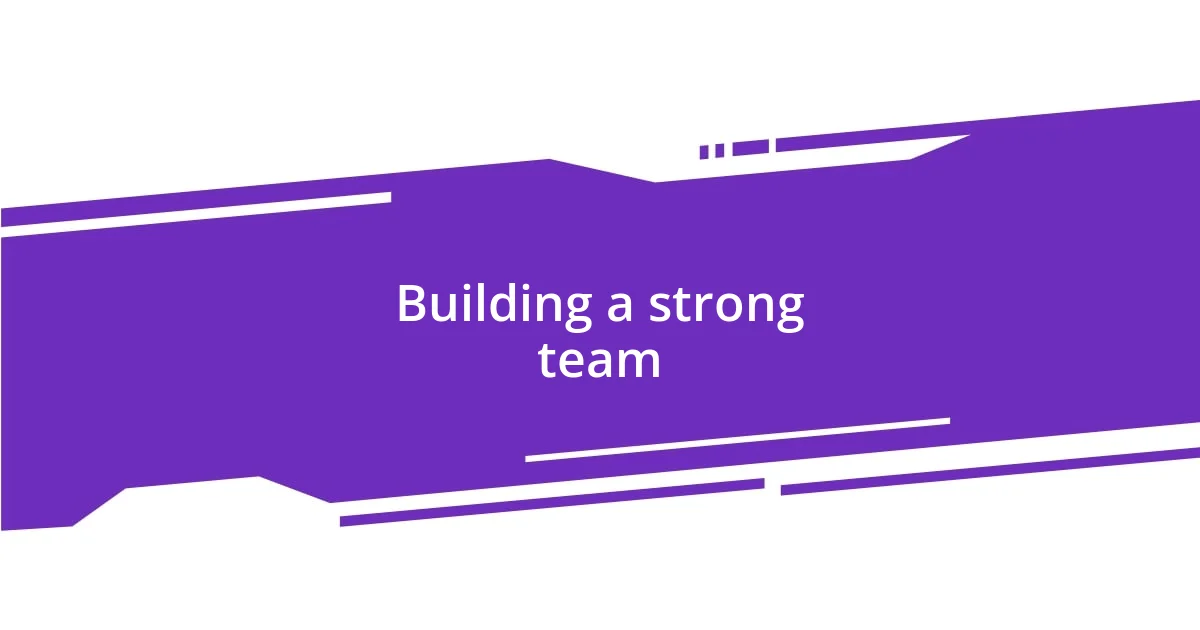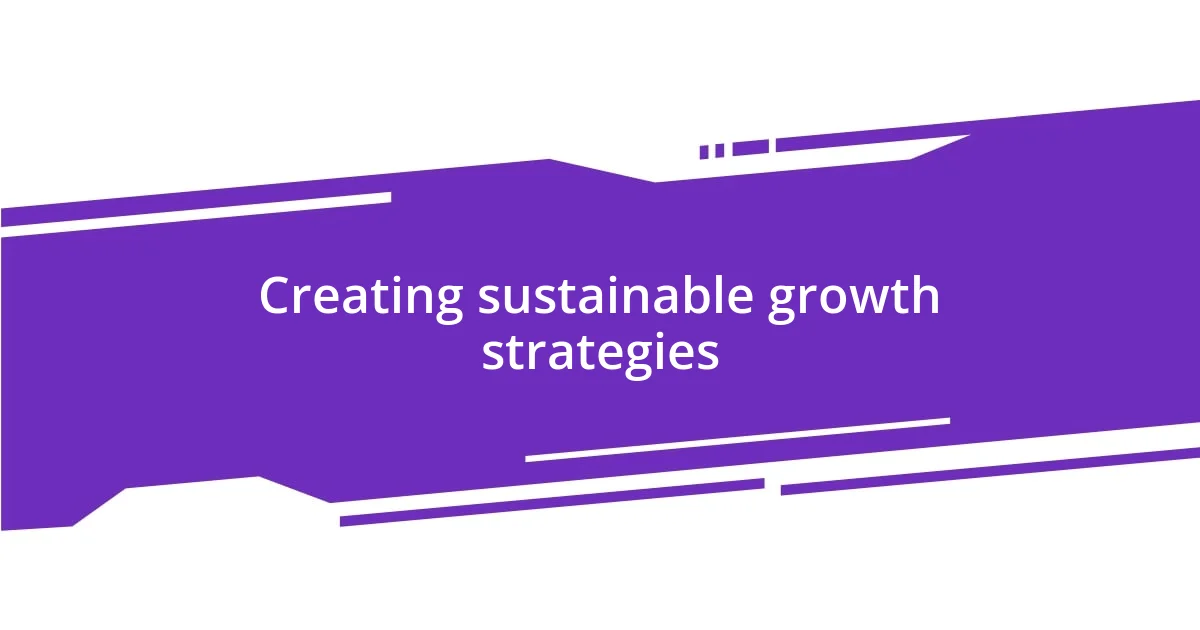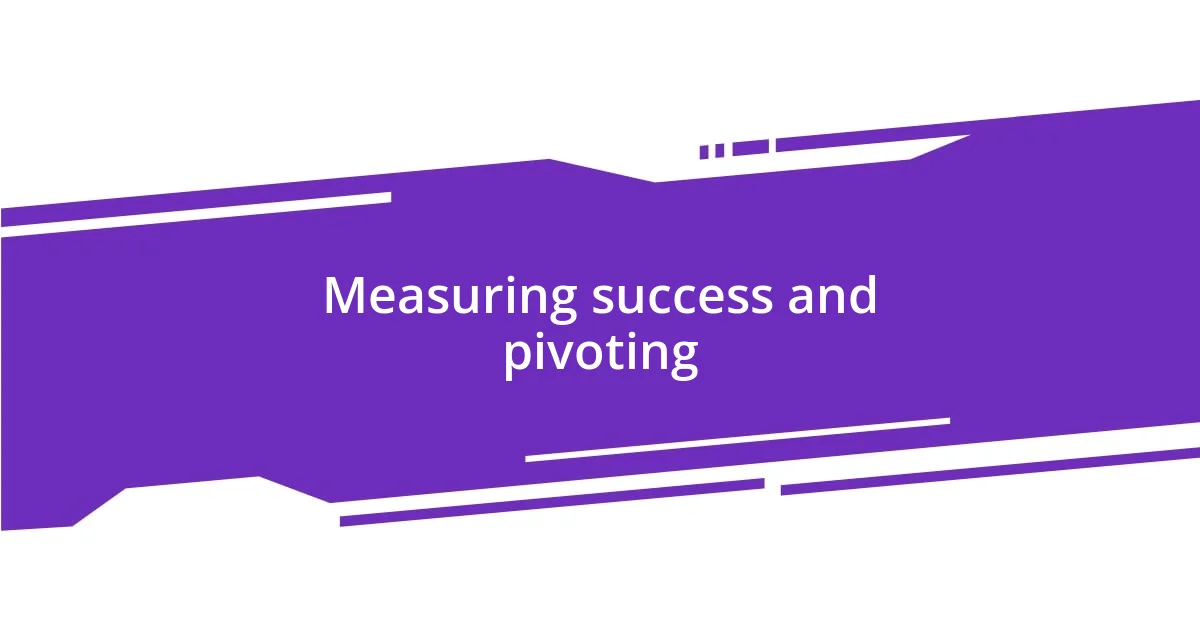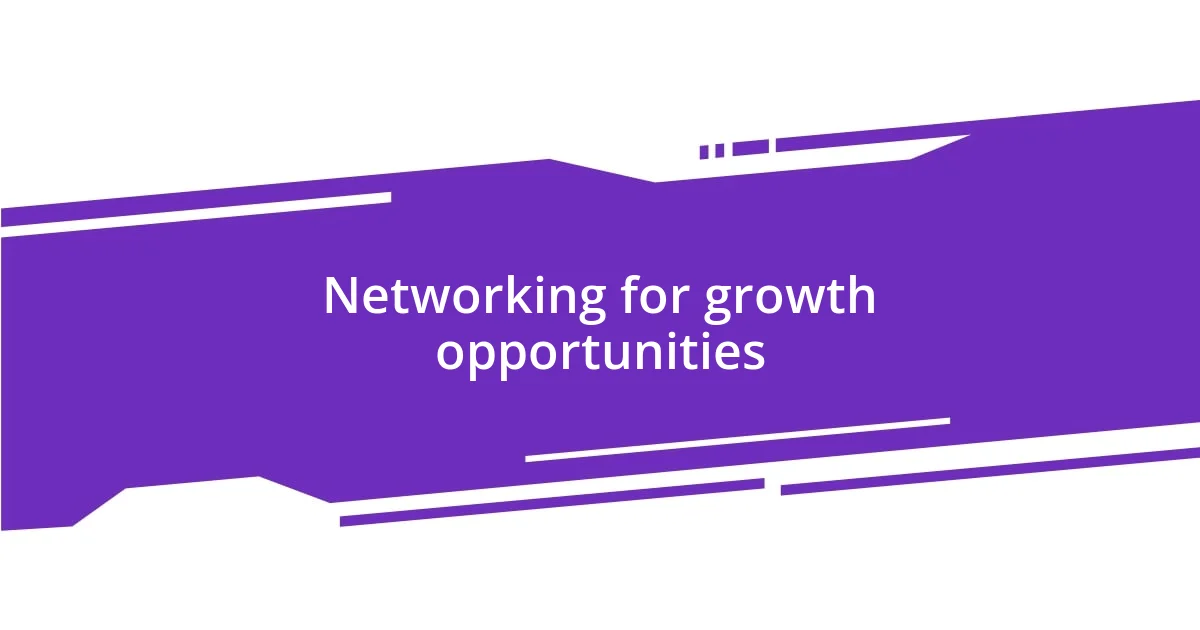Key takeaways:
- Identifying scalable ideas requires addressing widespread problems and leveraging technology for mass appeal.
- Understanding your target market through buyer personas, customer feedback, and adaptability enhances product relevance and marketing strategies.
- Building a strong team and a robust network fosters innovation, growth opportunities, and sustainable strategies through collaboration and open communication.

Identifying scalable business ideas
One of the most valuable lessons I’ve learned in my journey of scaling ventures is the importance of honing in on ideas that have the potential for mass appeal. I often find myself asking, “Will this solve a widespread problem?” When I identified a gap in the market for personalized online fitness coaching, it became clear that not only was I passionate about it, but the demand was also there. This kind of alignment can be the starting point for something truly scalable.
As I brainstorm potential ideas, I can’t help but reflect on the significance of leveraging technology. I remember when I launched a small e-commerce store; it was clear that digital platforms allowed me to reach a broader audience without the geographical constraints of a physical store. Do you see how this could apply to your ideas? Understanding whether your business can harness technology effectively can be a game changer.
Finally, the scalability of a business idea often hinges on its repeatability. A few years ago, I experimented with a subscription box service. The thrill of sending curated products each month was palpable, but the real breakthrough came when I realized the model could be replicated at scale. I encourage you to think: can your idea be easily replicated, or does it involve a one-time interaction? This mindset can shape your approach to identifying truly scalable opportunities.

Understanding your target market
Understanding your target market is a critical step in scaling any venture. I’ve found that really diving into who your customers are is nearly as important as the product itself. Recently, I took the time to create detailed buyer personas for my business. It was challenging yet enlightening, revealing insights about their preferences, pain points, and lifestyles. This exercise not only helped refine my marketing strategies but also made me feel a deeper connection to the people I was serving.
In my experience, actively seeking feedback from your target audience can be transformative. I remember launching a new feature based on a hunch. It turned out that I missed the mark entirely. However, using surveys afterward allowed me to pivot with clarity, focusing on what the customers actually wanted. This not only enhanced my product but also built trust with my users. Have you thought about how you can directly involve your audience in your decision-making process?
Moreover, staying adaptable is key when it comes to understanding market trends. I recall a time when our focus shifted dramatically due to external factors, compelling us to listen and evolve. By keeping a pulse on industry changes and customer needs, I learned how vital it was to remain nimble. I even set aside regular brainstorming sessions with my team to evaluate these shifts. Have you considered how regularly revisiting your understanding of the market can drive your success?
| Aspect | Importance |
|---|---|
| Buyer Personas | Help shape marketing and product strategies |
| Customer Feedback | Provides real insights and builds trust |
| Market Trends | Essential for adaptability and growth |

Building a strong team
Building a strong team is fundamental to scaling any venture. I’ve learned firsthand that surrounding yourself with the right people is crucial. When I first hired my team, I focused not just on skills but on cultural fit. One of my early hires turned into a key partner, helping to shape our company’s vision and values. I still remember how invigorating it felt to collaborate with someone who not only complemented my strengths but pushed me to think differently.
Creating a strong team goes beyond just finding talent; it involves fostering an environment of trust and collaboration. I’ve found that regular team-building activities can make a huge difference. Here are some essential practices that have worked for me:
- Open Communication: Encouraging transparency allows everyone to voice their thoughts without fear.
- Shared Goals: Aligning individual goals with the company vision helps create a sense of purpose.
- Diversity in Skills: Diverse backgrounds and perspectives can lead to innovative solutions.
- Recognition: Celebrating small wins motivates the team and builds morale.
- Continuous Learning: Promoting skill development helps team members grow and keeps the business agile.
Through these practices, I’ve witnessed firsthand how a strong team can be the backbone of scaling efforts, driving success and fostering a culture where creativity thrives.

Leveraging technology for efficiency
Leveraging technology has been a game-changer for me in maximizing efficiency within my ventures. I’ll never forget the moment we introduced a project management tool that centralized our tasks. Suddenly, chaotic email threads transformed into organized workflows, allowing the team to focus on what truly mattered. It made me wonder: how much time could we reclaim by streamlining our processes?
Automation is another powerful ally I’ve embraced. For instance, I used to spend hours updating spreadsheets manually until I integrated software that automated these tasks. The relief was palpable; not only did it liberate my time, but it also minimized human error. Have you thought about what tasks in your day-to-day operations could benefit from automation? I can assure you, easing those burdens opens up space for more strategic thinking.
Moreover, harnessing data analytics has profoundly impacted our decision-making. I remember feeling overwhelmed by numbers and reports in the past, but leveraging tools that visualize data helped clarify patterns and opportunities. The insights we derived not only fueled growth but also enabled us to make more informed choices. It makes me realize how critical it is to invest in technology that provides valuable insights—after all, data-driven decisions often lead to better outcomes.

Creating sustainable growth strategies
Creating sustainable growth strategies is all about framing the long game. I remember a time when we took a hard look at our revenue streams. It wasn’t just about chasing quick profits; we mapped out a plan that focused on customer retention alongside acquisition. When I realized that repeat customers were more cost-effective than new ones, it hit me—investing in relationships was a strategy worth scaling.
I’ve also learned that flexibility is crucial in sustaining growth. There were instances when I needed to pivot our offerings based on market feedback. For example, after a customer survey revealed that an unsung feature was highly appreciated, I decided to enhance that aspect. I can’t stress enough how listening to your customers is not just beneficial; it’s essential. It reminds me of a saying: if you’re not evolving, you’re losing ground.
Lastly, it’s vital to continuously assess and refine your strategy. I still conduct quarterly reviews of our growth metrics, which helps keep our goals aligned and relevant. Reflecting on my journey, I’ve found that these insights not only foster accountability but also inspire creativity. What practices do you have in place to ensure you’re on the right track? Whether it’s through regular brainstorming sessions or adapting to new market trends, I believe that keeping your strategy dynamic is key to sustainable growth.

Measuring success and pivoting
Measuring success in scaling my ventures has evolved beyond just tracking financial metrics. I recall a time when I diligently counted every dollar, but what really ignited progress was evaluating customer feedback. It was an eye-opener when I realized that a satisfied customer shared their experience with ten others, multiplying our reach organically. Have you ever considered how powerful word-of-mouth can be in measuring your success?
Pivoting has often been my lifeline during tumultuous times. There was a moment when our product was met with silence in the market, which was disheartening. But rather than digging in our heels, we consulted with our core customers and discovered their unmet needs. Shifting our focus to address those gaps not only revitalized our product line but made me appreciate how staying attuned to market demands can turn challenges into opportunities.
Regularly evaluating our success metrics is a practice I cherish. I’ve found that data points are most effective when they tell a story, not just a number. For instance, observing spikes in engagement during particular campaigns led us to cultivate similar initiatives. It reinforces my belief that success is not a destination but rather a continuous journey defined by the willingness to learn and adapt. What metrics do you track that paint a clearer picture of your progress?

Networking for growth opportunities
Building connections is pivotal for discovering growth opportunities. I remember attending a small industry conference where I struck up a conversation with a fellow entrepreneur. We shared our challenges and insights; that simple interaction led to a strategic partnership that ultimately expanded our market reach. Have you ever thought about how a casual conversation can open doors to new ventures?
I’ve also learned the importance of nurturing existing relationships. Regular check-ins with my network have proven invaluable, not just for gathering insights but also for offering support. For example, when a connection faced a significant hurdle, I was able to provide guidance based on my past experiences. It’s amazing how reciprocity in relationships can foster a network that not only thrives but actively encourages growth.
Networking isn’t just about what you can gain; it’s also about what you can give. Engaging in mentorship has broadened my perspective and put me in touch with fresh ideas and potential collaborations. Reflecting on these exchanges, I realize they enrich my journey in ways that cultivate not just personal growth, but also collective advancement within my community. Would you say your network feels like a source of inspiration, too?














